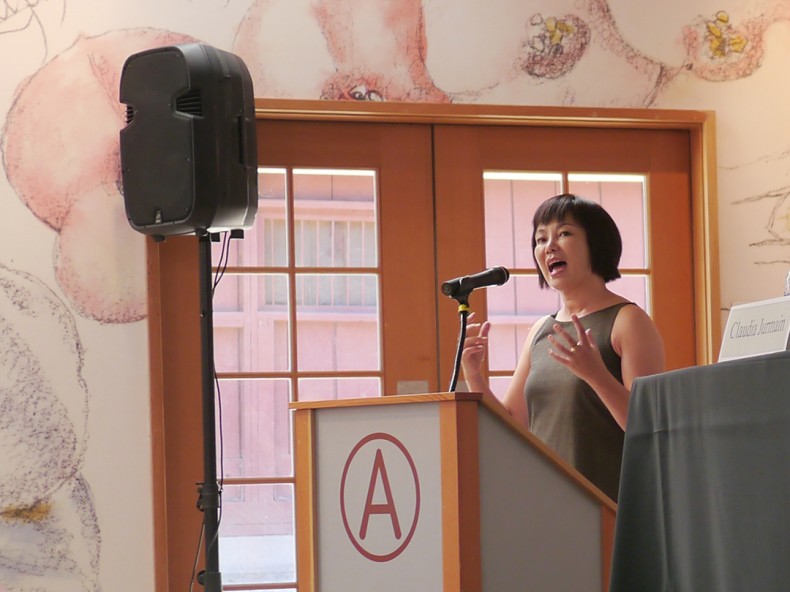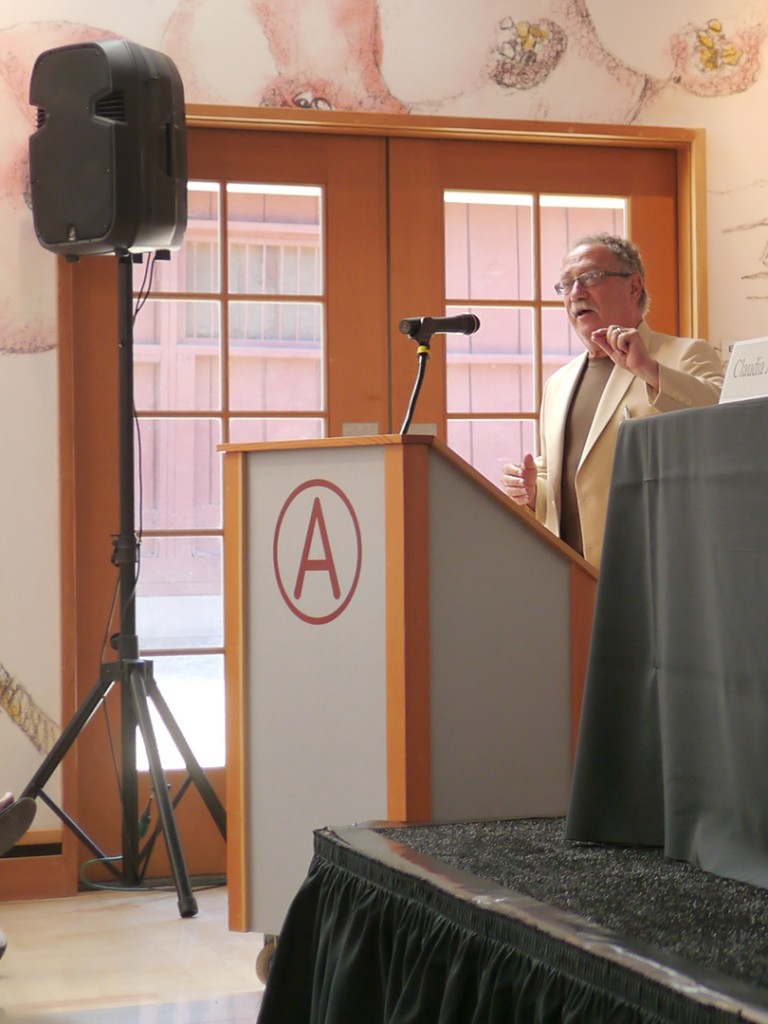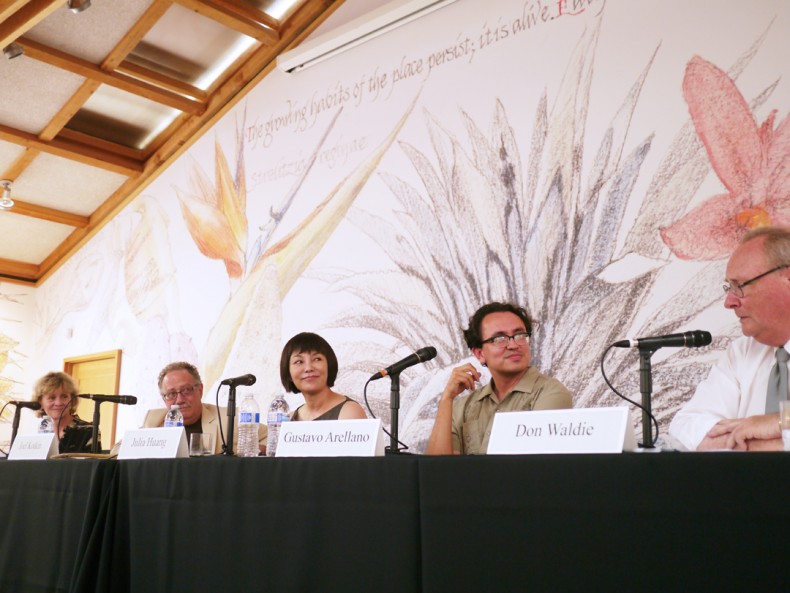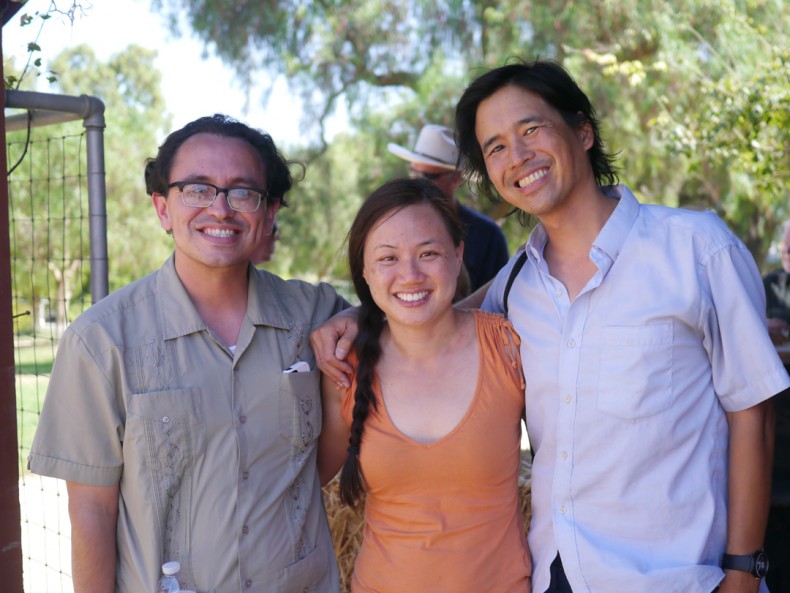Sep 16, 2014 Conversations in Place at The Rancho Los Alamitos recap
On Sunday I visited The Rancho Los Alamitos in Long Beach to check out an installment of its Conversations in Place 2014 series. The topic of discussion was “Should Our Future Cling to the Past?” and in addition to my friend, Imprint’s own Julia Huang, there were professor of urban planning and author Joel Kotkin and ¡Ask a Mexican! columnist and author Gustavo Arellano on the panel. Providing expert context and moderation were Alamitos regulars Claudia Jurmain and D.J. Waldie.
After housekeeping was tended to and introductions were made, Julia kicked off the program by sharing her experiences and insights as a transplant in terms of geography and culture who has not only made a home but an impact on Southern California. She humorously described the advertising world’s uncomfortable entry into the Asian market (KFC translating “finger lickin’ good” into “we’ll eat your fingers off” or Pepsi trying to reach the “new generation,” which meant zombies in Chinese) and recalled that she knew she could do better than that. Of course, interTrend has indeed done that and more, and she described how the company is weaving itself into the fabric of Long Beach as well.
Professor Kotkin took the podium next, and talked about how Southern California must meet its present challenges by revisiting its strengths from the past. In his estimation, Los Angeles flourished because it didn’t try to be Manhattan. These days, though, he suggests that the vision of spread out and diverse neighborhoods, backyard barbecues, and a thriving middle class must be made possible by established immigrants instead of big industries such as oil, agriculture, entertainment, and aerospace (which have all peaked out) or iron-fisted civic leadership (a thing of the past).
In the second half of the event, Waldie guided a conversation about ways Southern California can continue to function as a cultural Mecca, commercial center, and, perhaps most important, liveable home for its residents. Arellano began the discussion by saying that in his opinion Southern California is not on the verge of dystopia; its culture is more awesome and diverse than ever and unlike anything anywhere else in terms of human resources and energy.
Kotkin and Arellano debated whether the ascendance of cities like Houston symbolizes Southern California losing luster among commercial kingpins and immigrants alike. The former painted an image of Greater Los Angeles that is in the process of losing its identity and its livelihood; the latter countered that anyone would still rather be in SoCal, which has always had a knack for bouncing back and redefining itself. Meanwhile, Julia shed more light on her experience of not only growing a successful business in Long Beach but also being allowed to purchase the second-oldest building in the downtown area to secure and expand on its position in the community.
While there was a playful underlying debate over ethnicity, immigration, and class struggle, everyone seemed to agree that evolution and the mixing in of new cultures is not only inevitable but necessary in a multifaceted location such as Southern California. It also makes for better eating. When Jurmain cited the shifting of the multicultural American Dream from the Melting Pot to the Salad Bowl and pondered the importance of keeping one’s identity, Arellano went a step further with his Bowl of Nachos analogy. On the top layer, the pieces are distinct and easily identifiable but, toward the center, it becomes a gooey-but-awesome mess.
Arellano continued by touching on the importance of Mexican food making it into the American mainstream–the subject of his book Taco USA: How Mexican Food Conquered America. Kotkin described sushi dates with his daughter and Julia added that the best sushi in Long Beach happens to be in a mini mall across the street from Costco. It is that unassuming but real interconnection of food, culture, and people that touches on the what makes Southern California unique and great. The topic of food and its importance to Southern California will definitely be revisited at the next talk which features the Pulitzer Prize winning writer and friend of Imprint, Jonathan Gold.
What a cool series and what a gorgeous venue tucked between the Cal State Long Beach campus and the San Gabriel River. I look forward to attending more events there–especially if my wife and I get to meet a favorite writer like Arellano. More reasons why I personally love living in Southern California and don’t plan on moving any time soon.
Find out more about the Conversation in Place 2014 series of talks at rancholosalamitos.com and follow Imprint Culture Lab via Twitter, Instagram, and Facebook for more articles, events, and announcements…







